![]()
The Words of the Fiege Family
|
|
The Words of the Fiege Family |
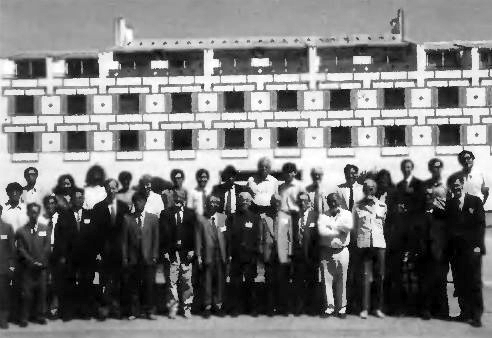
The
participants pose for a conference group photo
Freedom is precious. The spirit soars whenever it is experienced. Can it be preserved, enshrined, safeguarded? Perhaps many Americans would claim that it can and that the ' American Constitution provides such a safeguard for the freedoms of speech, assembly, and religion, to name only some of the cornerstones of democracy.
My thought was turned to the quest for freedom during my recent visit to China and more poignantly so after leaving and experiencing the crushing of the student demonstrations there. The occasion of my trip to Beijing in the last half of May 1989 was a conference on "Religion in China: Past and Present," co-sponsored by New ERA (New Ecumenical Research Association) and a Chinese cultural foundation. Ten Chinese scholars hosted ten scholars from Singapore and the West. It was a truly historical event: a free meeting of religious leaders and religious thinkers at the height of the demonstrations.
The conference was carefully prepared over a period of three years. That it in fact took place was in part due to the happy circumstance of China's economic and intellectual openness in the eighties, the farsightedness and support of Rev. Kwak, and the persistence of Professor Chung Ying Cheng of the University of Hawaii and Dr. Frank Flinn of New ERA who co-chaired the conference together with a Chinese counterpart. The uniqueness of this conference and its pioneering spirit attracted some of the most distinguished scholars in the field of religion.
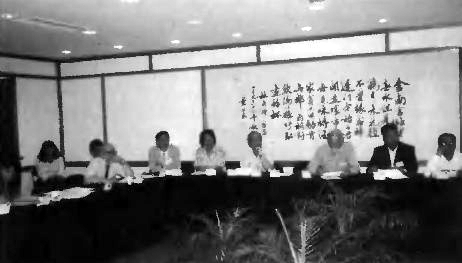
A
thoughtful conference session
Anticipations among the participants were high on both sides, though at times for different reasons. While the Chinese delegation was eager to hear about Western methods in the study of religion, the visiting delegation followed with great interest the reports on the state of the various religions in China. The Chinese spoke of a recent resurgence of almost all the great traditional religions in China (Confucianism, Buddhism, Taoism, Christianity and folk religions). At present it seems almost fashionable to join a Christian church, for throughout China Christianity and Western ways are equated. Of course, this is not to say that now religious people are free to worship anywhere in China. On the contrary, persecution of certain churches and temples in parts of China continues in subtle and not so subtle forms.
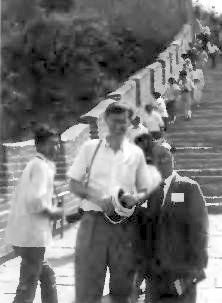
Franz
Feige and Chinese professor at the Great Wall
From the vantage point of the as of yet uncertain and groping Chinese attitudes towards religion, our conference set a promising landmark in China's recent religious history. It followed in the wake created by the thrust towards openness and greater freedoms. The conference reached one of its high points when one distinguished scholar with a Marxist background emphasized the importance of religion for China. This is representative of an opening in the discussion of religion in China. While Marxist perspectives endure, they are now joined by explicit religious perspectives. Some professors from abroad sought points of compatibility between the Chinese neo-Confucian roots and certain individualist elements stressed in Christian cultures of the West. The reappraisal of Chinese religion on the part of the visiting scholars and the hope that these religions and their ethics may be stimulating and beneficial to China's contemporary challenge were met at times with skepticism and criticism by some Chinese participants.
The ambiguity of the Chinese feeling about embracing their own traditions in their twentieth-century search for a place in the modern world can be experienced anywhere by an observant visitor. The Chinese responses in our conference were but one of the many expressions of a tacit reevaluation of the country's past. Sightseeing offered another opportunity to catch glimpses of China's struggle with its soul. Some of China's historic places are among the most magnificent in the world. Of course, the Great Wall, the Forbidden City, or the Temple of Heaven are world landmarks that people dream of visiting. They signify human efforts of unfathomable proportions and tell stories of a culture that in some respects has not been surpassed in magnitude of splendor, refinement, and sheer size.
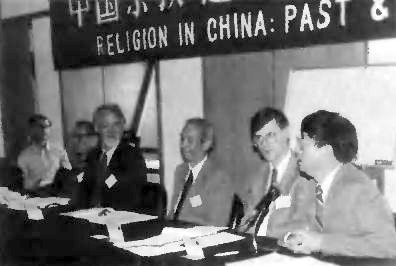
Co-chairman
Professor Cheng gives opening remarks
While standing in front of the Imperial Palace's Hall of Supreme Harmony I was reminded of the movie The Last Emperor. Being at the actual sight was breathtaking. The in\finite number of horizontal lines suggested by the contours of the sea of temples, halls, sleeping quarters, and structures of all kinds seemed to expand into all directions of the globe.
The symmetry of the layout made everything resonate in harmony. I felt like many past princes must have felt before: this is the navel of the world.
Soon these lofty thoughts and feelings gave way to images of the intrigues that must have haunted these halls. The splendor of the palace clashed with miseries outside its walls. Similar questions kept coming back at visits to other monuments of unsurpassed scale. As if it was not apparent, the Communist government reminded the casual visitor through signs at the Ming Tombs, for example, how much effort and human cost had gone into their construction. Yet it is hard to deny that all of these sights are also monuments to the human spirit. The Great Wall is but another unsurpassed example.
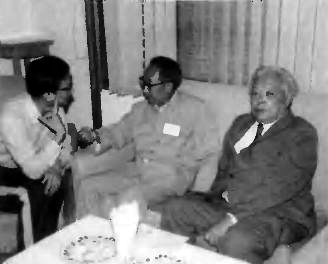
At
the welcoming reception
But these are relics of the past. My thoughts began again to wander to today's China. In this century, China has been involved in an effort of even greater proportions. The human cost, too, has been staggering. In a sense, China is trying to make good on a quest that is as old as humanity -- the quest for freedom and justice for all. I witnessed an outburst of that quest while in China. In the long run, freedom cannot be restrained. Real peace will only flow from social and political organizations in which freedom is given adequate interplay. In a way, modern history may be understood as a sojourn towards fulfilling the quest of the human spirit for true freedom. China will not be able to secure its place in the modern world without greater institutionalization of that freedom. When it finds its own institutional safeguards to freedom in the process, it will perhaps build its greatest monument to the human spirit yet. Only then can China's creativity and strength again become manifest in unsurpassed creations of that human spirit.
I am proud that New ERA could lend a helping hand in this process by raising the question about Chinese religion in free discussion. China today needs all of our prayers.